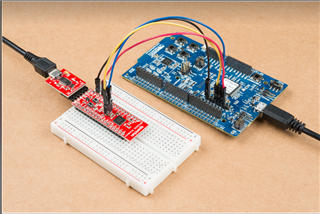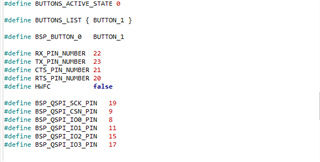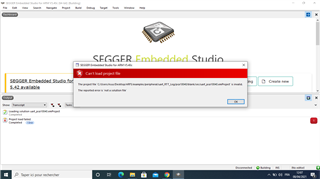Hi,
I am trying to test the uart exemple on nrf52840 using external debugging as shown in figure but it doesn't function !!!!
are there any modifications that need to be added compared to the internal debugging mode or is it the same thing?

Hi,
I am trying to test the uart exemple on nrf52840 using external debugging as shown in figure but it doesn't function !!!!
are there any modifications that need to be added compared to the internal debugging mode or is it the same thing?

Hi,
What board are you're flashing the UART example on?
are there any modifications that need to be added compared to the internal debugging mode or is it the same thing?
Yes, you need to change the board map file so that the pins on fits the board that you're using.
regards
Jared
I am flashing the example on the board nrf52832 and I put the connection of pins as following
Rx==> P08 (Pins of nrf52840)
Tx==>P06
CTS==>P07
RTS==>P05
then I put modification on the file pca10040.h to get the correspendant pin of nrf52840 but it doesn't function .

Hi,
Could you try to disable the RTT backend and see if the log output is displayed on PuTTY. Set
I disable the RTT backend but it doesn't work in putty
Hi,
So I'm not sure how I was able to miss this but using UART as a backend for the logger and at the same time using it in the application is not possible. You would therefore have to use RTT as the backend. I'm very sorry that I didn't realize this before.
regards
Jared
I want to use RTT as a backend for logger and the UART for the application it is not in the same time .
It is possible to use the UART for the application only?
nikola said:I want to use RTT as a backend for logger and the UART for the application it is not in the same time .
It is possible to use the UART for the application only?
You need to include the logger module in the application:
#include "nrf_log.h" #include "nrf_log_ctrl.h" #include "nrf_log_default_backends.h"
ret_code_t err_code = NRF_LOG_INIT(NULL);
APP_ERROR_CHECK(err_code);
NRF_LOG_DEFAULT_BACKENDS_INIT();Enable it in the config file with RTT as backend:
// <h> nRF_Log //========================================================== // <e> NRF_LOG_BACKEND_RTT_ENABLED - nrf_log_backend_rtt - Log RTT backend //========================================================== #ifndef NRF_LOG_BACKEND_RTT_ENABLED #define NRF_LOG_BACKEND_RTT_ENABLED 1 #endif // <o> NRF_LOG_BACKEND_RTT_TEMP_BUFFER_SIZE - Size of buffer for partially processed strings. // <i> Size of the buffer is a trade-off between RAM usage and processing. // <i> if buffer is smaller then strings will often be fragmented. // <i> It is recommended to use size which will fit typical log and only the // <i> longer one will be fragmented. #ifndef NRF_LOG_BACKEND_RTT_TEMP_BUFFER_SIZE #define NRF_LOG_BACKEND_RTT_TEMP_BUFFER_SIZE 64 #endif // <o> NRF_LOG_BACKEND_RTT_TX_RETRY_DELAY_MS - Period before retrying writing to RTT #ifndef NRF_LOG_BACKEND_RTT_TX_RETRY_DELAY_MS #define NRF_LOG_BACKEND_RTT_TX_RETRY_DELAY_MS 1 #endif // <o> NRF_LOG_BACKEND_RTT_TX_RETRY_CNT - Writing to RTT retries. // <i> If RTT fails to accept any new data after retries // <i> module assumes that host is not active and on next // <i> request it will perform only one write attempt. // <i> On successful writing, module assumes that host is active // <i> and scheme with retry is applied again. #ifndef NRF_LOG_BACKEND_RTT_TX_RETRY_CNT #define NRF_LOG_BACKEND_RTT_TX_RETRY_CNT 3 #endif // </e> // <e> NRF_LOG_ENABLED - nrf_log - Logger //========================================================== #ifndef NRF_LOG_ENABLED #define NRF_LOG_ENABLED 1 #endif // <h> Log message pool - Configuration of log message pool //========================================================== // <o> NRF_LOG_MSGPOOL_ELEMENT_SIZE - Size of a single element in the pool of memory objects. // <i> If a small value is set, then performance of logs processing // <i> is degraded because data is fragmented. Bigger value impacts // <i> RAM memory utilization. The size is set to fit a message with // <i> a timestamp and up to 2 arguments in a single memory object. #ifndef NRF_LOG_MSGPOOL_ELEMENT_SIZE #define NRF_LOG_MSGPOOL_ELEMENT_SIZE 20 #endif // <o> NRF_LOG_MSGPOOL_ELEMENT_COUNT - Number of elements in the pool of memory objects // <i> If a small value is set, then it may lead to a deadlock // <i> in certain cases if backend has high latency and holds // <i> multiple messages for long time. Bigger value impacts // <i> RAM memory usage. #ifndef NRF_LOG_MSGPOOL_ELEMENT_COUNT #define NRF_LOG_MSGPOOL_ELEMENT_COUNT 8 #endif // </h> //========================================================== // <q> NRF_LOG_ALLOW_OVERFLOW - Configures behavior when circular buffer is full. // <i> If set then oldest logs are overwritten. Otherwise a // <i> marker is injected informing about overflow. #ifndef NRF_LOG_ALLOW_OVERFLOW #define NRF_LOG_ALLOW_OVERFLOW 1 #endif // <o> NRF_LOG_BUFSIZE - Size of the buffer for storing logs (in bytes). // <i> Must be power of 2 and multiple of 4. // <i> If NRF_LOG_DEFERRED = 0 then buffer size can be reduced to minimum. // <128=> 128 // <256=> 256 // <512=> 512 // <1024=> 1024 // <2048=> 2048 // <4096=> 4096 // <8192=> 8192 // <16384=> 16384 #ifndef NRF_LOG_BUFSIZE #define NRF_LOG_BUFSIZE 1024 #endif // <q> NRF_LOG_CLI_CMDS - Enable CLI commands for the module. #ifndef NRF_LOG_CLI_CMDS #define NRF_LOG_CLI_CMDS 0 #endif // <o> NRF_LOG_DEFAULT_LEVEL - Default Severity level // <0=> Off // <1=> Error // <2=> Warning // <3=> Info // <4=> Debug #ifndef NRF_LOG_DEFAULT_LEVEL #define NRF_LOG_DEFAULT_LEVEL 3 #endif // <q> NRF_LOG_DEFERRED - Enable deffered logger. // <i> Log data is buffered and can be processed in idle. #ifndef NRF_LOG_DEFERRED #define NRF_LOG_DEFERRED 1 #endif // <q> NRF_LOG_FILTERS_ENABLED - Enable dynamic filtering of logs. #ifndef NRF_LOG_FILTERS_ENABLED #define NRF_LOG_FILTERS_ENABLED 0 #endif // <q> NRF_LOG_NON_DEFFERED_CRITICAL_REGION_ENABLED - Enable use of critical region for non deffered mode when flushing logs. // <i> When enabled NRF_LOG_FLUSH is called from critical section when non deffered mode is used. // <i> Log output will never be corrupted as access to the log backend is exclusive // <i> but system will spend significant amount of time in critical section #ifndef NRF_LOG_NON_DEFFERED_CRITICAL_REGION_ENABLED #define NRF_LOG_NON_DEFFERED_CRITICAL_REGION_ENABLED 0 #endif // <o> NRF_LOG_STR_PUSH_BUFFER_SIZE - Size of the buffer dedicated for strings stored using @ref NRF_LOG_PUSH. // <16=> 16 // <32=> 32 // <64=> 64 // <128=> 128 // <256=> 256 // <512=> 512 // <1024=> 1024 #ifndef NRF_LOG_STR_PUSH_BUFFER_SIZE #define NRF_LOG_STR_PUSH_BUFFER_SIZE 128 #endif // <o> NRF_LOG_STR_PUSH_BUFFER_SIZE - Size of the buffer dedicated for strings stored using @ref NRF_LOG_PUSH. // <16=> 16 // <32=> 32 // <64=> 64 // <128=> 128 // <256=> 256 // <512=> 512 // <1024=> 1024 #ifndef NRF_LOG_STR_PUSH_BUFFER_SIZE #define NRF_LOG_STR_PUSH_BUFFER_SIZE 128 #endif // <e> NRF_LOG_USES_COLORS - If enabled then ANSI escape code for colors is prefixed to every string //========================================================== #ifndef NRF_LOG_USES_COLORS #define NRF_LOG_USES_COLORS 0 #endif // <o> NRF_LOG_COLOR_DEFAULT - ANSI escape code prefix. // <0=> Default // <1=> Black // <2=> Red // <3=> Green // <4=> Yellow // <5=> Blue // <6=> Magenta // <7=> Cyan // <8=> White #ifndef NRF_LOG_COLOR_DEFAULT #define NRF_LOG_COLOR_DEFAULT 0 #endif // <o> NRF_LOG_ERROR_COLOR - ANSI escape code prefix. // <0=> Default // <1=> Black // <2=> Red // <3=> Green // <4=> Yellow // <5=> Blue // <6=> Magenta // <7=> Cyan // <8=> White #ifndef NRF_LOG_ERROR_COLOR #define NRF_LOG_ERROR_COLOR 2 #endif // <o> NRF_LOG_WARNING_COLOR - ANSI escape code prefix. // <0=> Default // <1=> Black // <2=> Red // <3=> Green // <4=> Yellow // <5=> Blue // <6=> Magenta // <7=> Cyan // <8=> White #ifndef NRF_LOG_WARNING_COLOR #define NRF_LOG_WARNING_COLOR 4 #endif // </e> // <e> NRF_LOG_USES_TIMESTAMP - Enable timestamping // <i> Function for getting the timestamp is provided by the user //========================================================== #ifndef NRF_LOG_USES_TIMESTAMP #define NRF_LOG_USES_TIMESTAMP 0 #endif // <o> NRF_LOG_TIMESTAMP_DEFAULT_FREQUENCY - Default frequency of the timestamp (in Hz) or 0 to use app_timer frequency. #ifndef NRF_LOG_TIMESTAMP_DEFAULT_FREQUENCY #define NRF_LOG_TIMESTAMP_DEFAULT_FREQUENCY 0 #endif // </e> // <h> nrf_log module configuration
Also, remember to include the path to the source files.
regards
Jared
nikola said:I want to use RTT as a backend for logger and the UART for the application it is not in the same time .
It is possible to use the UART for the application only?
You need to include the logger module in the application:
#include "nrf_log.h" #include "nrf_log_ctrl.h" #include "nrf_log_default_backends.h"
ret_code_t err_code = NRF_LOG_INIT(NULL);
APP_ERROR_CHECK(err_code);
NRF_LOG_DEFAULT_BACKENDS_INIT();Enable it in the config file with RTT as backend:
// <h> nRF_Log //========================================================== // <e> NRF_LOG_BACKEND_RTT_ENABLED - nrf_log_backend_rtt - Log RTT backend //========================================================== #ifndef NRF_LOG_BACKEND_RTT_ENABLED #define NRF_LOG_BACKEND_RTT_ENABLED 1 #endif // <o> NRF_LOG_BACKEND_RTT_TEMP_BUFFER_SIZE - Size of buffer for partially processed strings. // <i> Size of the buffer is a trade-off between RAM usage and processing. // <i> if buffer is smaller then strings will often be fragmented. // <i> It is recommended to use size which will fit typical log and only the // <i> longer one will be fragmented. #ifndef NRF_LOG_BACKEND_RTT_TEMP_BUFFER_SIZE #define NRF_LOG_BACKEND_RTT_TEMP_BUFFER_SIZE 64 #endif // <o> NRF_LOG_BACKEND_RTT_TX_RETRY_DELAY_MS - Period before retrying writing to RTT #ifndef NRF_LOG_BACKEND_RTT_TX_RETRY_DELAY_MS #define NRF_LOG_BACKEND_RTT_TX_RETRY_DELAY_MS 1 #endif // <o> NRF_LOG_BACKEND_RTT_TX_RETRY_CNT - Writing to RTT retries. // <i> If RTT fails to accept any new data after retries // <i> module assumes that host is not active and on next // <i> request it will perform only one write attempt. // <i> On successful writing, module assumes that host is active // <i> and scheme with retry is applied again. #ifndef NRF_LOG_BACKEND_RTT_TX_RETRY_CNT #define NRF_LOG_BACKEND_RTT_TX_RETRY_CNT 3 #endif // </e> // <e> NRF_LOG_ENABLED - nrf_log - Logger //========================================================== #ifndef NRF_LOG_ENABLED #define NRF_LOG_ENABLED 1 #endif // <h> Log message pool - Configuration of log message pool //========================================================== // <o> NRF_LOG_MSGPOOL_ELEMENT_SIZE - Size of a single element in the pool of memory objects. // <i> If a small value is set, then performance of logs processing // <i> is degraded because data is fragmented. Bigger value impacts // <i> RAM memory utilization. The size is set to fit a message with // <i> a timestamp and up to 2 arguments in a single memory object. #ifndef NRF_LOG_MSGPOOL_ELEMENT_SIZE #define NRF_LOG_MSGPOOL_ELEMENT_SIZE 20 #endif // <o> NRF_LOG_MSGPOOL_ELEMENT_COUNT - Number of elements in the pool of memory objects // <i> If a small value is set, then it may lead to a deadlock // <i> in certain cases if backend has high latency and holds // <i> multiple messages for long time. Bigger value impacts // <i> RAM memory usage. #ifndef NRF_LOG_MSGPOOL_ELEMENT_COUNT #define NRF_LOG_MSGPOOL_ELEMENT_COUNT 8 #endif // </h> //========================================================== // <q> NRF_LOG_ALLOW_OVERFLOW - Configures behavior when circular buffer is full. // <i> If set then oldest logs are overwritten. Otherwise a // <i> marker is injected informing about overflow. #ifndef NRF_LOG_ALLOW_OVERFLOW #define NRF_LOG_ALLOW_OVERFLOW 1 #endif // <o> NRF_LOG_BUFSIZE - Size of the buffer for storing logs (in bytes). // <i> Must be power of 2 and multiple of 4. // <i> If NRF_LOG_DEFERRED = 0 then buffer size can be reduced to minimum. // <128=> 128 // <256=> 256 // <512=> 512 // <1024=> 1024 // <2048=> 2048 // <4096=> 4096 // <8192=> 8192 // <16384=> 16384 #ifndef NRF_LOG_BUFSIZE #define NRF_LOG_BUFSIZE 1024 #endif // <q> NRF_LOG_CLI_CMDS - Enable CLI commands for the module. #ifndef NRF_LOG_CLI_CMDS #define NRF_LOG_CLI_CMDS 0 #endif // <o> NRF_LOG_DEFAULT_LEVEL - Default Severity level // <0=> Off // <1=> Error // <2=> Warning // <3=> Info // <4=> Debug #ifndef NRF_LOG_DEFAULT_LEVEL #define NRF_LOG_DEFAULT_LEVEL 3 #endif // <q> NRF_LOG_DEFERRED - Enable deffered logger. // <i> Log data is buffered and can be processed in idle. #ifndef NRF_LOG_DEFERRED #define NRF_LOG_DEFERRED 1 #endif // <q> NRF_LOG_FILTERS_ENABLED - Enable dynamic filtering of logs. #ifndef NRF_LOG_FILTERS_ENABLED #define NRF_LOG_FILTERS_ENABLED 0 #endif // <q> NRF_LOG_NON_DEFFERED_CRITICAL_REGION_ENABLED - Enable use of critical region for non deffered mode when flushing logs. // <i> When enabled NRF_LOG_FLUSH is called from critical section when non deffered mode is used. // <i> Log output will never be corrupted as access to the log backend is exclusive // <i> but system will spend significant amount of time in critical section #ifndef NRF_LOG_NON_DEFFERED_CRITICAL_REGION_ENABLED #define NRF_LOG_NON_DEFFERED_CRITICAL_REGION_ENABLED 0 #endif // <o> NRF_LOG_STR_PUSH_BUFFER_SIZE - Size of the buffer dedicated for strings stored using @ref NRF_LOG_PUSH. // <16=> 16 // <32=> 32 // <64=> 64 // <128=> 128 // <256=> 256 // <512=> 512 // <1024=> 1024 #ifndef NRF_LOG_STR_PUSH_BUFFER_SIZE #define NRF_LOG_STR_PUSH_BUFFER_SIZE 128 #endif // <o> NRF_LOG_STR_PUSH_BUFFER_SIZE - Size of the buffer dedicated for strings stored using @ref NRF_LOG_PUSH. // <16=> 16 // <32=> 32 // <64=> 64 // <128=> 128 // <256=> 256 // <512=> 512 // <1024=> 1024 #ifndef NRF_LOG_STR_PUSH_BUFFER_SIZE #define NRF_LOG_STR_PUSH_BUFFER_SIZE 128 #endif // <e> NRF_LOG_USES_COLORS - If enabled then ANSI escape code for colors is prefixed to every string //========================================================== #ifndef NRF_LOG_USES_COLORS #define NRF_LOG_USES_COLORS 0 #endif // <o> NRF_LOG_COLOR_DEFAULT - ANSI escape code prefix. // <0=> Default // <1=> Black // <2=> Red // <3=> Green // <4=> Yellow // <5=> Blue // <6=> Magenta // <7=> Cyan // <8=> White #ifndef NRF_LOG_COLOR_DEFAULT #define NRF_LOG_COLOR_DEFAULT 0 #endif // <o> NRF_LOG_ERROR_COLOR - ANSI escape code prefix. // <0=> Default // <1=> Black // <2=> Red // <3=> Green // <4=> Yellow // <5=> Blue // <6=> Magenta // <7=> Cyan // <8=> White #ifndef NRF_LOG_ERROR_COLOR #define NRF_LOG_ERROR_COLOR 2 #endif // <o> NRF_LOG_WARNING_COLOR - ANSI escape code prefix. // <0=> Default // <1=> Black // <2=> Red // <3=> Green // <4=> Yellow // <5=> Blue // <6=> Magenta // <7=> Cyan // <8=> White #ifndef NRF_LOG_WARNING_COLOR #define NRF_LOG_WARNING_COLOR 4 #endif // </e> // <e> NRF_LOG_USES_TIMESTAMP - Enable timestamping // <i> Function for getting the timestamp is provided by the user //========================================================== #ifndef NRF_LOG_USES_TIMESTAMP #define NRF_LOG_USES_TIMESTAMP 0 #endif // <o> NRF_LOG_TIMESTAMP_DEFAULT_FREQUENCY - Default frequency of the timestamp (in Hz) or 0 to use app_timer frequency. #ifndef NRF_LOG_TIMESTAMP_DEFAULT_FREQUENCY #define NRF_LOG_TIMESTAMP_DEFAULT_FREQUENCY 0 #endif // </e> // <h> nrf_log module configuration
Also, remember to include the path to the source files.
regards
Jared
I have already performed all these steps but it dosen't work
Hi,
I forgot to add that you need to include the SEGGER RTT files that is located in SDK_ROOT/external/segger_rtt/
I've attached an UART example that prints out the data that is received over RTT by using the logger module.
regards
Jared
I cannot open this file with segger

Strange, I tried downloading the file and was able to open it just fine. Are you sure that you're opening the correct file? You should open the SEGGER Embedded Studio Project File:

yes I just open this file